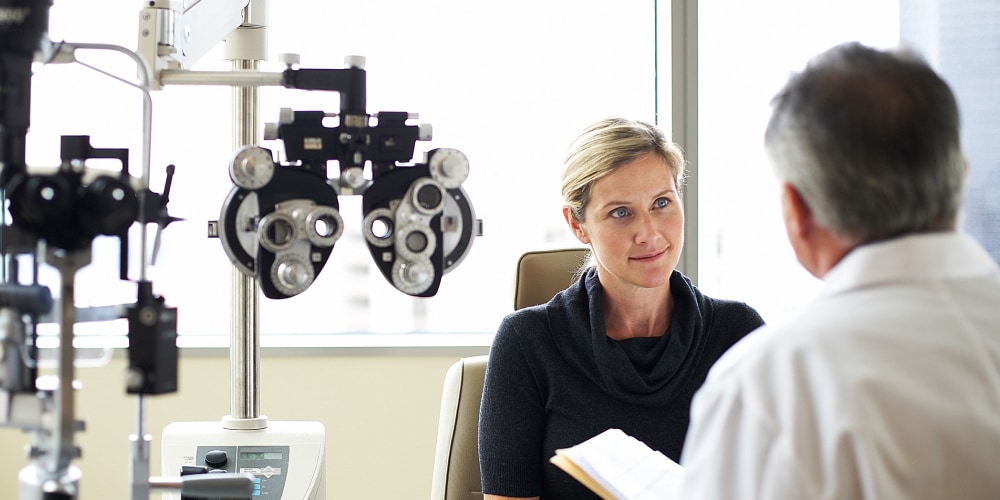Understanding the Differences Between Optometrists, Ophthalmologists and Opticians
Guides & How To

Understanding the Differences Between Types of Eye Doctors and Vision Specialists
Optometrists, ophthalmologists and opticians are all eye care providers.
Optometrists and ophthalmologists are eye doctors who help keep your eyes and vision healthy. Opticians are technicians who work with you to make sure you have the right eyewear for your prescription and lifestyle.
What Is an Optometrist?
An optometrist is a health care provider who takes care of your eyes. When you go for your annual eye exam, it’s very likely that your eye care provider is an optometrist.
Optometrists are doctors but not medical doctors (MD). They go to optometry school instead of medical school and earn a doctor of optometry (OD) degree.
What Does an Optometrist Do?
An optometrist is a primary care provider for your eyes. They are focused on your overall eye health and provide care such as:
- Performing comprehensive eye exams.
- Treating common vision issues, such as nearsightedness, farsightedness, astigmatism and double vision.
- Diagnosing and treating eye diseases and conditions. Examples include glaucoma, cataracts, macular degeneration and dry eye.
- Prescribing medications to treat eye problems.
- Treating eye infections and inflammation.
- Prescribing and fitting eyeglasses and contact lenses.
- Monitoring eye conditions related to health concerns such as diabetes and thyroid disease.
An optometrist can perform some surgery, depending on the state in which they practice. This can include laser eye surgery and removing foreign bodies from your eye.
How Does Someone Become an Optometrist?
It takes four years to earn a Doctorate of Optometry (OD) degree. Most optometrists get a four-year undergraduate degree before going to optometry school.
After graduation, optometrists can start practicing right away. They can also complete a one-year residency to specialize in areas such as pediatrics and eye diseases.
When Should I See an Optometrist?
A comprehensive eye exam is an important part of health care. The American Optometric Association recommends adults 18 to 64 who don’t have any eye problems get an exam every two years. Adults 65 and older and people who are at risk for eye diseases should have an eye exam every year.
Many eye issues and diseases that can affect your vision don’t have any signs or symptoms. By having routine eye exams, your eye doctor can diagnose and treat you to help prevent permanent damage and vision loss.
Your optometrist will also refer you to a specialist if you have a vision issue that needs more testing or possible surgery.
What Is an Ophthalmologist?
An ophthalmologist is a medical doctor (MD) or doctor of osteopathy (DO) who specializes in eye surgery. They also have specific training and experience diagnosing and treating eye and vision conditions.
What Does an Ophthalmologist Do?
As an eye doctor, they can provide the same eye care as an optometrist. Plus, they can:
- Perform surgeries, such as glaucoma surgery, retinal detachment repair, LASIK and cataract surgery.
- Diagnose, treat and manage eye conditions with both medication and surgery.
- Provide pre- and post-surgical management.
- Give injections inside the eye to treat diseases and conditions. These include diabetes and macular degeneration.
What Education Is Required?
All ophthalmologists must graduate from medical school. After that, they have an ophthalmology residency program, which can last for four to seven years. The residency gives them more surgery experience, and they learn more about eye diseases.
Ophthalmologists can also specialize in certain areas such as pediatrics or neurology.
When Do I See an Ophthalmologist?
There are reasons you may need to see an ophthalmologist instead of an optometrist. You may need to see an ophthalmologist if you:
- Have more advanced or complicated eye conditions.
- Need eye surgery.
- Have medical conditions that can also cause eye problems. Diabetes, high blood pressure or autoimmune diseases can all cause eye and vision issues.
- Have blurry vision (even if temporary), double vision or excessive tearing.
- Have a loss of peripheral vision
- See a halo around lights or new floaters (black circles) or flashes of light in your vision.
- Need reconstructive surgery around the eye.
- Have a sudden change in your vision or in eye symptoms.
What’s the Difference Between an Optometrist and an Ophthalmologist?
Both work to ensure that you have healthy eyes and clear vision.
Optometrists handle routine care such as giving eye exams and prescribing glasses or contacts. Ophthalmologists can perform eye surgery and provide specialized care when needed.
What Is an Optician?
Opticians are technicians who fill the prescription your eye doctor gives you. They don’t test vision, write prescriptions, or diagnose or treat eye diseases.
What Does an Optician Do?
Opticians are specialists in eye care and help make sure you have the right vision correction. Their job includes:
- Helping choose which type of lenses and frames work best both for your vision needs and style preferences.
- Checking lens prescriptions.
- Taking facial measurements.
- Adjusting and repairing glasses and frames.
- Fitting you for contact lenses.
- Educating patients about lens options (both for eyeglasses and contacts).
- Helping patients navigate vision insurance and submit insurance information.
- Keeping records of patient information and purchases.
- Managing and ordering eyewear inventory.
- Scheduling appointments and sending reminders for routine follow-ups.
What Education Is Required?
Education for opticians varies depending on the state in which they practice. Most opticians complete one to two years of training by getting an associate’s degree. They might also earn an optician certificate or work as an apprentice to an optometrist or ophthalmologist.
When Do I See an Optician?
During a regular eye exam, you’ll often see your optician before and after the doctor performs the exam. They can help prepare you for your appointment. After your exam, they will help you choose the right vision correction based on your prescription and preferences.
You can also see the optician if you need your eyewear fixed or replaced.
How to Choose the Eye Care Professional You Need
Not sure which eye care professional you need? Consider the following to help you choose:
- Go to your optometrist for regular eye care. This includes routine eye exams, to refill or get a new vision prescription or if you need a refill of any medication your eye doctor prescribed for you.
- Visit the ophthalmologist if you have more serious eye conditions, such as cataracts or glaucoma, or to get laser eye surgery.
- See the optician to fill your glasses or contact lens prescription, or if you need your eyewear adjusted.
All three types of professionals work together to make sure your eyes are healthy and that you can see clearly.













